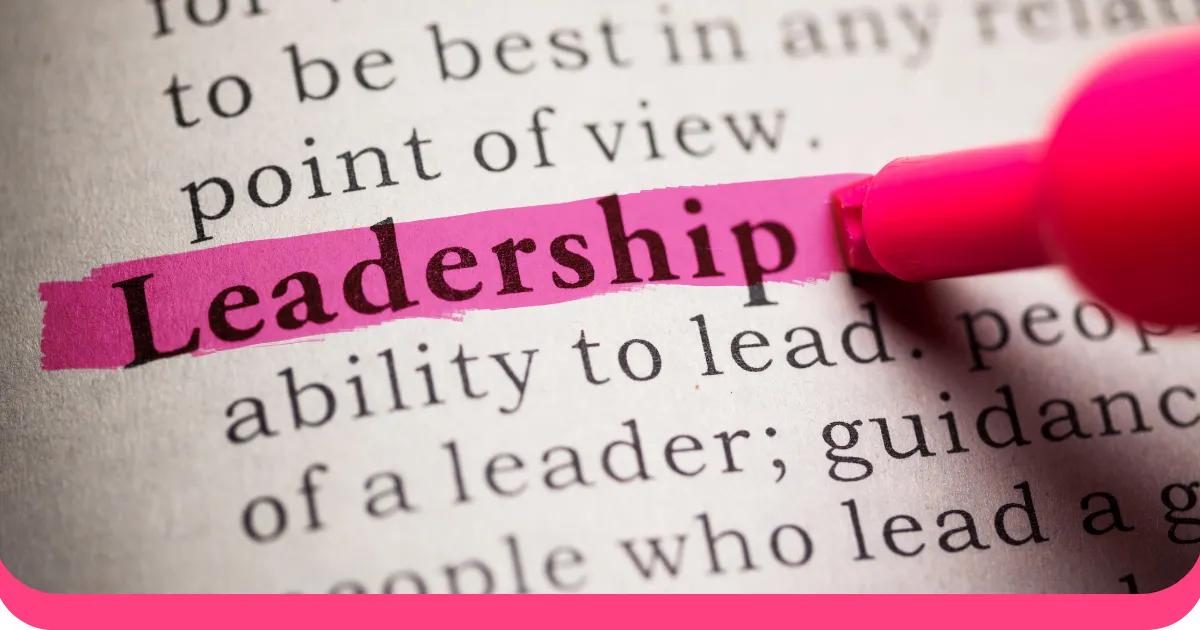What makes someone an effective leader? After decades of research and countless studies, the answer isn't about being born with special talents. Leadership is a skill that can be learned and developed by anyone willing to invest the effort.
Whether you're leading a small team or managing an entire organisation, understanding and developing core leadership qualities is essential for success. According to the Centre for Creative Leadership, which has studied leadership for over 50 years, the best leaders consistently demonstrate specific traits and behaviours that inspire trust, motivate teams, and drive results.
This comprehensive guide explores 18 essential leadership qualities, backed by research and real-world examples. You'll learn not just what these qualities are, but how to develop them in yourself and your team.
What defines good leadership?
Before diving into specific qualities, it's helpful to understand what leadership actually means. Leadership goes beyond job titles or authority. At its core, leadership is the ability to influence and inspire others to work toward shared goals whilst creating an environment where people can thrive.
Research from Gallup shows that great leaders focus on building relationships, developing people, leading change, and inspiring others. They create direction, alignment, and commitment within their teams.
Importantly, leadership differs from management. Managers focus on processes, procedures, and maintaining systems. Leaders inspire vision, foster innovation, and guide people through change. The most effective professionals develop both management and leadership skills.
The research behind leadership qualities
Understanding effective leadership isn't guesswork. Decades of research from institutions like Harvard Business School, the Centre for Creative Leadership, and Gallup have identified consistent patterns in successful leaders.
A landmark study published in the Harvard Business Review found that whilst leadership styles may vary, certain fundamental qualities appear across all effective leaders regardless of industry or context. These include integrity, communication ability, emotional intelligence, and the capacity to inspire others.
More recent research highlights how leadership requirements have evolved. Modern leaders must navigate hybrid work environments, lead diverse global teams, and adapt quickly to technological change. This means traditional leadership qualities remain essential, but new competencies around digital fluency and cultural intelligence are increasingly important.
Leadership styles and when to use them
Different situations call for different leadership approaches. Understanding various leadership styles helps you adapt your approach based on your team's needs and the challenges you face.
Transformational leadership
Transformational leaders inspire their teams to exceed expectations through vision and motivation. They're excellent for organizations undergoing change or pursuing ambitious goals. These leaders focus on developing people and creating a culture of innovation.
Servant leadership
Servant leaders prioritize their team's needs above their own. They focus on empowerment, collaboration, and building strong relationships. This style works particularly well in organisations that value employee wellbeing and long-term development.
Authoritative leadership
Not to be confused with authoritarian, authoritative leaders set clear direction whilst encouraging input. They establish the vision and provide guidance whilst giving teams autonomy in execution. This approach works well when clear direction is needed but team expertise should be leveraged.
Delegative leadership
Delegative leaders trust their teams to make decisions and take ownership. They provide resources and support but step back from day-to-day oversight. This style is effective with experienced, self-motivated teams.
Participative leadership
Participative leaders actively involve team members in decision-making. They seek diverse perspectives and build consensus. This approach fosters engagement and works well for complex problems requiring diverse expertise.
Transactional leadership
Transactional leaders use clear structures, rewards, and consequences to drive performance. Whilst less inspiring than transformational leadership, this approach can be effective in environments requiring strict adherence to processes and procedures.
Most effective leaders don't stick to one style but adapt based on circumstances, using different approaches for different situations and team members.
18 essential qualities of a good leader
1. Integrity
Integrity forms the foundation of effective leadership. Leaders with integrity align their actions with their values, maintain honesty even when difficult, and create an environment of trust.
Research from the Centre for Creative Leadership shows that integrity is particularly critical for senior leaders, as it influences organizational culture and employee engagement. When leaders demonstrate integrity, team members are more likely to trust decisions, communicate openly, and commit to organizational goals.
How to develop it: Clarify your core values and make them visible in your decision-making. When you make a mistake, admit it openly and explain how you'll address it. Follow through on commitments, even small ones.
2. Clear communication
Effective leaders excel at conveying information clearly, listening actively, and adapting their communication style to different audiences. Communication is consistently ranked as one of the most critical leadership skills across all industries.
Good communication involves more than just speaking well. It requires active listening, the ability to read non-verbal cues, and knowing when and how to deliver different types of messages. Leaders must communicate strategy, provide feedback, resolve conflicts, and inspire action.
According to research published in the Harvard Business Review, the quality of leadership communication directly impacts team performance and business outcomes.
How to develop it: Practice active listening by focusing entirely on the speaker without planning your response. Seek feedback on your communication style. Vary your communication methods (face-to-face, written, presentations) to reach different team members effectively.
3. Self-awareness
Self-aware leaders understand their strengths, weaknesses, emotional triggers, and how their behavior affects others. This quality enables leaders to leverage their strengths, compensate for weaknesses, and make better decisions.
Research shows that self-aware leaders create more engaged teams and achieve better results. Yet surprisingly, a study of HR leaders found that only one in five managers truly understands their own strengths and development areas.
Self-awareness involves understanding both how you see yourself and how others perceive you. It requires honest self-reflection and willingness to accept feedback, even when uncomfortable.
How to develop it: Regularly seek feedback from peers, team members, and supervisors. Take personality assessments or leadership style inventories. Keep a journal to reflect on your decisions and their outcomes. Consider working with a mentor or coach.
4. Emotional intelligence
Emotional intelligence (EQ) is the ability to recognize, understand, and manage your own emotions whilst also perceiving and influencing the emotions of others. Leaders with high EQ navigate difficult conversations more effectively, build stronger relationships, and create more positive work environments.
A 2023 research review found that leaders with high emotional intelligence significantly improve team performance and business outcomes. The World Economic Forum lists emotional intelligence among the top 15 most in-demand skills for the future of work.
How to develop it: Practice recognizing your emotional responses before reacting. Develop empathy by actively considering others' perspectives. Learn to regulate your emotions in stressful situations through techniques like mindfulness or breathing exercises.
5. Vision
Great leaders see beyond immediate challenges to articulate a compelling future. Vision provides direction, inspires commitment, and helps teams understand how their daily work contributes to larger goals.
Visionary leadership involves more than just having ideas. It requires the ability to communicate that vision in ways others can understand and feel motivated by. Research from the Centre for Creative Leadership shows that purpose-driven leaders who connect daily tasks to meaningful outcomes achieve higher engagement and better results.
How to develop it: Spend time thinking strategically about where your team or organisation should be in 3-5 years. Practice articulating this vision in simple, compelling terms. Connect individual roles to the broader purpose regularly.
6. Adaptability
In today's rapidly changing business environment, adaptability is essential. Adaptable leaders remain effective when circumstances shift, pivot strategies when needed, and help their teams navigate uncertainty.
The ability to adapt doesn't mean lacking conviction. Rather, it involves staying open to new information, adjusting approaches based on results, and remaining calm when plans change.
How to develop it: Challenge yourself to try new approaches to familiar problems. Practice reframing setbacks as learning opportunities. Build comfort with ambiguity by taking on projects outside your usual expertise.
7. Decisiveness
Leaders must make countless decisions, often with incomplete information and under time pressure. Decisive leaders analyze situations quickly, commit to a course of action, and move forward confidently whilst remaining open to adjusting if needed.
Indecisiveness creates uncertainty, delays progress, and undermines confidence in leadership. However, decisiveness doesn't mean making rash choices. It means gathering appropriate information quickly, considering key factors, and making timely decisions.
How to develop it: Practice making smaller decisions quickly to build confidence. Establish decision-making frameworks so you don't re-evaluate criteria each time. Set deadlines for decisions and stick to them.
8. Accountability
Accountable leaders take responsibility for outcomes, both positive and negative. They don't blame others when things go wrong, and they follow through on commitments consistently.
Creating a culture of accountability starts with leaders modeling it themselves. When leaders admit mistakes, explain their thinking, and commit to improvements, team members feel safer taking similar ownership.
How to develop it: When something goes wrong, ask yourself what you could have done differently before looking at external factors. Share your goals publicly and report on progress regularly. Acknowledge when you haven't met commitments and explain your plan to improve.
9. Empathy
Empathy allows leaders to understand and share the feelings of others. Empathetic leaders build stronger relationships, create more inclusive environments, and respond more effectively to team members' needs.
Whilst empathy was once seen as a "soft" skill, research now shows it's critical for effective leadership. Empathetic leadership is strongly associated with employee wellbeing and can make leaders more effective by enhancing self-awareness and listening skills.
How to develop it: Practice active listening without immediately trying to solve problems. Ask questions to understand others' perspectives before sharing your own. Consider how decisions will impact different team members.
10. Delegation
Effective leaders understand they can't do everything themselves. Delegation develops team members, distributes workload appropriately, and ensures leaders can focus on high-priority responsibilities.
Good delegation involves more than just offloading tasks. It requires understanding team members' skills and development goals, providing clear expectations, offering appropriate support, and trusting people to deliver.
How to develop it: Identify tasks that others could do (even if you could do them faster initially). Provide clear context and expectations when delegating. Resist the urge to micromanage once you've delegated responsibility.
11. Resilience
Resilient leaders bounce back from setbacks, maintain composure under pressure, and help their teams navigate difficulties. They view challenges as opportunities for growth rather than insurmountable obstacles.
Resilience is particularly important in today's business environment, characterized by rapid change, uncertainty, and unexpected disruptions. Leaders who demonstrate resilience inspire their teams to persevere through difficulties.
How to develop it: Reframe setbacks as learning experiences. Build a support network of peers and mentors. Develop healthy stress management practices like exercise, adequate sleep, and time for reflection.
12. Courage
Courageous leaders make difficult decisions, have challenging conversations, and take calculated risks when necessary. They speak up for what's right even when it's unpopular, and they're willing to be vulnerable.
Courage doesn't mean absence of fear. It means taking action despite fear or discomfort. Research shows that leaders who promote psychological safety—where team members feel safe taking risks and speaking up—create more innovative, higher-performing teams.
How to develop it: Start with smaller acts of courage to build confidence. Speak up in meetings when you have a different perspective. Address problems directly rather than avoiding difficult conversations.
13. Continuous learning
The best leaders are committed to ongoing learning and development. They stay curious, seek out new knowledge, and adapt their approaches based on what they learn.
In rapidly changing fields, yesterday's expertise quickly becomes outdated. Leaders who prioritize learning set an example for their teams and ensure they can guide effectively through new challenges.
How to develop it: Set regular learning goals for yourself. Read widely in your field and adjacent areas. Seek out experiences that challenge your current thinking. Ask for feedback and actually use it to improve.
14. Gratitude
Leaders who express genuine appreciation create more engaged, motivated teams. Gratitude strengthens relationships, boosts morale, and encourages continued effort.
Research shows that employees who feel appreciated are more productive and less likely to leave their organizations. Yet many leaders underestimate how much their appreciation matters to team members.
How to develop it: Make specific, timely appreciation a habit. Notice and acknowledge both major achievements and daily efforts. Thank people publicly when appropriate and privately when personal recognition is more fitting.
15. Collaboration
Collaborative leaders recognize that the best outcomes come from diverse perspectives working together. They build bridges across different teams, departments, and organisations to achieve shared goals.
In today's interconnected business environment, the ability to collaborate across boundaries is increasingly critical. Leaders must work effectively with people from different backgrounds, locations, and areas of expertise.
How to develop it: Actively seek input from diverse sources when making decisions. Create opportunities for cross-functional work. Model collaborative behavior by sharing credit and building on others' ideas.
16. Strategic thinking
Strategic leaders analyze situations from multiple angles, anticipate future challenges and opportunities, and determine the best path forward. They balance short-term needs with long-term goals.
Strategic thinking involves understanding how different factors interact, recognizing patterns, and making connections others might miss. It requires stepping back from day-to-day operations to see the bigger picture.
How to develop it: Regularly dedicate time to strategic thinking away from daily tasks. Study your industry's trends and anticipate how they might affect your organization. Practice scenario planning for different possible futures.
17. Authenticity
Authentic leaders align their words with their actions and aren't afraid to be themselves. They build trust through consistency and transparency about their values and intentions.
Authenticity doesn't mean sharing everything or lacking professional boundaries. It means being genuine in your interactions, admitting when you don't have all the answers, and leading from your true values rather than trying to be someone you're not.
How to develop it: Identify and articulate your core values. Be honest about your strengths and limitations. Share appropriate personal stories that help your team understand your perspective and motivations.
18. Confidence
Confident leaders believe in their abilities and inspire that same confidence in others. They set ambitious goals, tackle challenges head-on, and project assurance even in uncertain situations.
Confidence differs from arrogance. Confident leaders acknowledge what they don't know, seek input from others, and remain open to being wrong. Their confidence comes from self-awareness and past successes rather than inflated self-importance.
How to develop it: Build competence through preparation and practice. Celebrate your successes to reinforce positive self-belief. Focus on your strengths whilst working to develop areas of weakness. Seek positions that stretch your abilities gradually.
How to develop leadership qualities
Understanding these qualities is just the first step. Developing them requires intentional effort and practice. Here are evidence-based approaches for building your leadership capabilities:
Seek diverse experiences
Take on projects outside your comfort zone. Volunteer for cross-functional teams. Accept stretch assignments that challenge you to develop new skills. Research shows that varied experiences are among the most effective ways to develop leadership abilities.
Find mentors and models
Observe leaders you admire and analyze what makes them effective. Seek mentors who can provide guidance and feedback. Consider working with a professional coach for personalized development support.
Practice deliberate reflection
Regularly reflect on your leadership experiences. What went well? What could you have done differently? How did your actions affect others? Keeping a leadership journal can help you learn from both successes and setbacks.
Invest in formal learning
Consider leadership training program, workshops, or even advanced degrees in leadership or management. Formal education provides frameworks, tools, and peer learning opportunities that accelerate development.
Create feedback loops
Actively seek feedback from team members, peers, and supervisors. Use 360-degree assessments to understand how others perceive your leadership. Most importantly, act on the feedback you receive.
Start where you are
You don't need a leadership title to develop leadership qualities. Look for opportunities to demonstrate leadership in your current role, whether leading a project, mentoring colleagues, or taking initiative to solve problems.
Common leadership challenges and solutions
Even experienced leaders face recurring challenges. Understanding these common obstacles and how to address them can accelerate your leadership development.
Challenge: Balancing empathy with accountability
Solution: Empathy and accountability aren't opposites. Have honest conversations about performance whilst showing you care about people as individuals. Set clear expectations whilst providing support for meeting them.
Challenge: Making decisions with incomplete information
Solution: Accept that you'll rarely have perfect information. Establish decision criteria in advance. Gather the most critical information within your time constraints, then commit to a decision whilst remaining open to adjusting based on new data.
Challenge: Delegating when you could do it faster yourself
Solution: Remember that the goal of delegation isn't just task completion but team development. Initially investing time in delegation pays dividends through increased team capability and your own freed capacity.
Challenge: Maintaining work-life balance whilst leading
Solution: Model healthy boundaries for your team. Protect time for strategic thinking and personal renewal. Remember that sustainable leadership requires taking care of yourself as well as your team.
Challenge: Leading through change and uncertainty
Solution: Communicate frequently and honestly about what you know and don't know. Involve your team in problem-solving. Focus on what you can control whilst acknowledging uncertainty.
Leadership in the modern workplace
The nature of work has evolved significantly in recent years, and leadership must evolve with it. Today's leaders face unique challenges that require adapting traditional leadership qualities to new contexts.
Leading hybrid and remote teams
Modern leaders must maintain team cohesion and culture without daily face-to-face interaction. This requires more intentional communication, creative approaches to team building, and trust in team members' ability to work autonomously.
Effective remote leadership involves over-communicating, creating structured opportunities for both formal and informal interaction, and being more intentional about recognizing contributions.
Embracing diversity and inclusion
Today's leaders work with teams spanning different cultures, generations, backgrounds, and perspectives. This diversity is a strength, but it requires leaders to develop cultural intelligence and create genuinely inclusive environments where all voices are heard.
Navigating digital transformation
As technology reshapes how work gets done, leaders must guide their teams through continuous change. This requires staying informed about technological trends whilst focusing on the human elements of change management.
Supporting wellbeing and preventing burnout
The boundaries between work and personal life have blurred, making employee wellbeing a critical leadership concern. Leaders must prioritize their own wellbeing whilst creating environments where team members can thrive sustainably.
Measuring your leadership development
How do you know if you're improving as a leader? While leadership development is a journey rather than a destination, these indicators can help you gauge progress:
Team performance improvements: Are your team members achieving better results over time? Do they take more initiative and ownership?
Engagement and retention: Do people want to work with you? Is your team engaged in their work? Do you retain good performers?
Feedback trends: When you seek feedback over time, do you see improvements in areas you've focused on developing?
Your own experience: Do you feel more confident handling leadership challenges? Are difficult situations feeling more manageable?
Career progression: Are you being given increased responsibility and leadership opportunities?
Remember that setbacks are normal. Leadership development isn't linear, and everyone faces challenges. What matters is your commitment to continuous improvement.
Frequently asked questions
What's the most important quality of a good leader?
Whilst all leadership qualities matter, research consistently highlights integrity as foundational. Without integrity and trustworthiness, other leadership qualities become less effective. However, the most important quality can vary by context and what your particular team needs most.
Are leaders born or made?
Research conclusively shows that leadership can be learned and developed. Whilst some people may have natural inclinations toward certain leadership qualities, anyone can become an effective leader through experience, intentional development, and practice. The Centre for Creative Leadership's 50+ years of research confirms that leadership is a skill that can be developed.
How long does it take to develop leadership qualities?
Leadership development is a continuous journey rather than a fixed destination. You can see improvements in specific areas within months with focused effort, but becoming a well-rounded leader typically takes years of varied experiences. Most leadership development happens through on-the-job experience combined with reflection and formal learning.
Can introverts be effective leaders?
Absolutely. Introverted leaders often excel at listening, thinking strategically, and building deep one-on-one relationships. Different leadership qualities suit different personality types. The key is understanding your natural strengths and developing complementary skills.
What's the difference between a leader and a manager?
Leaders focus on inspiring vision, driving change, and developing people. Managers focus on processes, executing plans, and maintaining systems. The best professionals develop both leadership and management capabilities, applying each as situations require.
How can I practice leadership without a formal leadership role?
You can demonstrate leadership regardless of your position by taking initiative on projects, mentoring others, solving problems proactively, and influencing positive change. Look for opportunities to lead informal teams, volunteer for cross-functional projects, or take ownership of improvements in your area.
What if I'm naturally lacking in certain leadership qualities?
Everyone has natural strengths and areas requiring development. The key is self-awareness: understand your gaps and work intentionally to develop those areas whilst leveraging your strengths. Consider partnering with others whose strengths complement yours.
How do I know which leadership style to use?
The most effective leaders adapt their style to the situation. Consider your team's experience level, the urgency of the situation, the complexity of the challenge, and what will best serve your team's development. Experience and reflection will help you make these judgements more quickly over time.
Key takeaways
Becoming an effective leader is a journey of continuous learning and development. Here are the essential points to remember:
- Leadership is a learned skill that anyone can develop through experience, reflection, and intentional practice
- The 18 essential leadership qualities include integrity, communication, self-awareness, emotional intelligence, vision, adaptability, and more
- Different leadership styles suit different situations; the best leaders adapt their approach based on context
- Modern leadership requires navigating hybrid work, embracing diversity, and supporting team wellbeing
- Leadership development happens through diverse experiences, seeking feedback, reflective practice, and formal learning
- You don't need a formal leadership title to begin developing and demonstrating leadership qualities
The leaders who make the greatest impact are those who commit to continuous improvement, remain authentic to their values, and focus on developing others whilst developing themselves.
Start by identifying 2-3 qualities to develop first. Seek opportunities to practice them. Reflect on your experiences. Gather feedback. And remember that every great leader started exactly where you are now—committed to becoming better.








